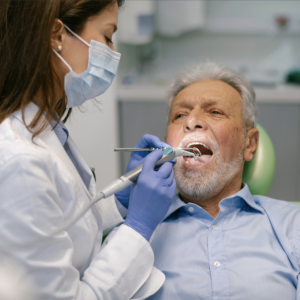Mouth Off: Are You Practicing Good Dental Hygiene?

Mouth Off: Are You Practicing Good Dental Hygiene?
February 9, 2022
Have you been back? Are you fearful of what will be found? Are you balancing the risk of ongoing dental problems with the embarrassment you may feel when your dentist finds out how poorly you’ve managed your dental hygiene during the pandemic? If you’re fearful and concerned about sitting back in that chair, you’re not alone. Dentists around the country report that “two-year truants” are returning to their offices with all sorts of pandemic-related problems, such as cracked teeth or excessive teeth grinding, in addition to the normal dental concerns that arise as you age. Whether it’s the stress that’s bubbled up over the past couple of years or the loss of income or insurance that’s meant lack of money for dental care, many of us are in a heap of trouble when it comes to our mouths at this point. For a general overview of proper oral health care and necessary dental maintenance, grab your toothbrush and click here.
As we’ve noted previously, proper dental care not only ensures a healthy mouth but also supports more general physical and cognitive healthy aging. Regarding aging-related problems that can arise in your mouth, there’s everything from darkening tooth enamel and dry mouth (problematic because saliva is necessary for clearing out harmful bacteria) to root canal and even tooth loss. Tooth loss has been linked to social isolation in recent research (socially isolated individuals are more likely to be missing teeth and lose their teeth more quickly over time) and in a recent study published in the Journal of the American Medical Directors Association, tooth loss has also been associated with a higher risk of cognitive impairment and dementia, with the risk rising with each tooth lost. Another new study in the British Medical Journal Open documented that gum disease is associated with an increase in the risk of diabetes, heart disease, and mental health problems. So clearly better dental health equates with better general health.
The problem for many, however, is that access to proper dental care is unattainable. As the prospects for adding dental coverage to Medicare through the Build Back Better legislation fizzled this past Fall, the reality of how we pay for dental care, especially for our older citizens, came into stark relief. As you likely know, Medicare Part A and B pay for very few types of dental procedures (certainly not routine maintenance or routine office procedures). While some Medicare Advantage Plans offer some level of dental coverage, the reality is that these plans are often limited in scope and capped with how much coverage they provide, thereby leaving many expensive procedures beyond reach for those without private funds. And if you do have an Advantage plan that purports to cover dental care, don’t fall for the misinformation floating around the internet that you’ll receive a “flex card” that can pay for all your dental needs as well as other basic necessities.
There are other options available, none of which rise to the level of comprehensive and accessible dental coverage. For example, there are stand-alone dental insurance plans with a limited number of dentists accepting such coverage and there are dental membership groups where you pay a monthly fee in order to obtain discounted pricing on various dental procedures, but again, your options for finding a dentist are limited. The Wall Street Journal (paywall) recently described new financing entities that are partnering with dental practices to provide financing for various dental procedures. There are also the options of seeking out dental hygienists (who in many states can provide basic dental care with dentist oversight) or finding dental schools that provide low-cost care delivered by dentists-in-training. In many areas of the country, there are free pop-up dental clinics (under the rubric of Missions Of Mercy) but these tend to be sporadic during the pandemic and fill up quickly with attendees desperate for urgently needed dental care (see this recent New Yorker article detailing the experiences of one such clinic in Philadelphia). It’s very much a less than perfect “system” in place to pay for dental care for those without sufficient insurance or private funds.
There are also many older adults, either due to living in a long-term care facility or being unable to leave their homes, for whom dental care is also unattainable. In response, there are now mobile dental units serving various facilities, virtual dental visits (that really should only accompany in-person visits), and even geriatric dentists who make house calls. Yet these services are just a drop-in-the-bucket compared to what would constitute a comprehensive dental system servicing our senior population. It’s an interesting but unfortunate history as to why dental care and dental insurance were carved out of Medicare and the more general health insurance systems as they were developing. In the end, your best bet, especially if you lack the means to pay for extensive dental care, is to practice good dental hygiene and proactive, preventive care. For some good, basic advice, grab your rinse and look here.







